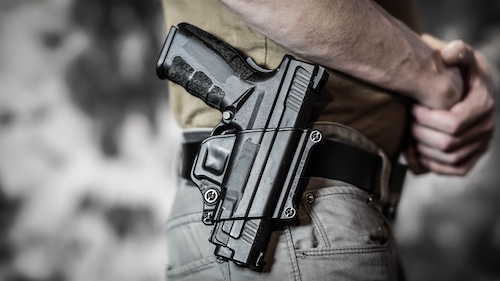Understand Tennessee’s Open Carry Laws Before You Carry
Tennessee allows many adults to carry handguns openly without a permit, but that freedom comes with limits. Mistakes in how or where a firearm is carried can lead to serious criminal charges. Knowing the law is the first step to carrying safely and legally in public.
In this blog, you’ll learn the basics of Tennessee’s open carry laws, common mistakes, and how a Nashville criminal defense lawyer can help if you are charged.
What “Open Carry” Means in Tennessee
Understanding what open carry means under Tennessee law helps gun owners avoid legal mistakes.
Definition of Open Carry
In Tennessee, open carry refers to carrying a firearm openly in plain sight. This means the weapon is fully visible or partially visible to others in public areas. A visible firearm is one that can be seen without needing to move clothing or other items. Open carry is different from concealed carry, where the weapon is hidden from view.
Tennessee law allows people to carry handguns openly in most public spaces, but carrying long guns (like rifles or shotguns) is not treated the same way and can lead to police attention or legal issues.
Tennessee Is a Permitless Carry State
Tennessee is a permitless carry state. This means that, as of July 1, 2021, most adults can carry firearms openly without a carry permit, as long as they meet certain requirements. This includes being at least 21 years old or 18 for military members, and not being prohibited by law from owning a gun. The legal support for this comes from T.C.A. § 39-17-1307(g).
Despite this, many responsible gun owners still choose to get a concealed carry or enhanced handgun carry permit for travel and legal clarity.
Open Carry Is Legal but Limited
While Tennessee generally allows open carry, it is not allowed everywhere. Local laws, federal property rules, and signs posted by private businesses may ban firearms, even if state law permits lawful possession. Violating these local restrictions can result in charges.
It’s also important to carry the weapon in a secure holster and avoid any behavior that may appear threatening. Carrying a loaded handgun in public may be legal, but careless actions can still lead to police involvement.
Open Carry vs. Concealed Carry
Open carry involves making the firearm visible, while concealed carry means keeping it hidden. Tennessee does not require a permit for either, but there are benefits to having a permit, such as better recognition from law enforcement and reciprocity in other states.
Some people may prefer concealed firearms to avoid drawing attention, but both types of public carry have legal protections under current state statutes, if done properly.
Legal Framework Governing Open Carry in Tennessee
Tennessee law sets specific rules for how, where, and by whom firearms can be carried openly in public.
State Statutes Allowing Open Carry
Tennessee allows most adults to carry handguns without a carry permit. This applies to both open carry and concealed carry. Individuals must be at least 21 years old, or 18 if they are military members. They must also be legally allowed to possess a firearm. This law supports the right to bear arms while still placing limits on certain types of people and conduct.
Open carry refers only to handguns. Tennessee does not extend the same protection to long guns in public areas. Carrying rifles or shotguns openly may result in attention from law enforcement and possible legal issues, even if the firearm is unloaded.
Lawful Possession and Prohibited Persons
Tennessee limits firearm possession to individuals who are not prohibited under state or federal law. According to T.C.A. § 39-17-1307(b), people with felony convictions, certain domestic violence records, or a history of being involuntarily committed are banned from owning or carrying firearms. Being caught openly carrying while prohibited can result in serious criminal charges.
Firearms must also have valid serial numbers and cannot be stolen. Lawful possession includes both legal ownership and physical control of the firearm.
What Can and Cannot Be Carried
The law allows loaded handguns to be carried openly in public by qualifying individuals. Unloaded firearms may still be subject to scrutiny if carried in a way that causes public alarm. Carrying a firearm openly that is visible and secured is generally allowed, but showing it in a threatening way can be a criminal act.
Carrying certain firearms or ammunition in restricted locations is still generally prohibited, regardless of open carry laws. Gun owners must understand where public carry is accepted and where it is not.
Permit Still Useful for Some Gun Owners
Even though a permit is not required, many people still apply for a concealed carry permit or an enhanced handgun carry permit. These permits are helpful for carrying across state lines and for legal protection during interactions with police officers. They may also be required in some local jurisdictions that have additional gun laws or local restrictions.
Who Can and Cannot Open Carry
Tennessee law does not allow everyone to carry firearms openly. This section explains who qualifies and who is legally restricted.
Who Can Open Carry in Tennessee
Adults who are at least 21 years old can carry handguns openly in public under T.C.A. § 39-17-1307(g). The age drops to 18 for military members who are lawfully present in the United States. These individuals do not need a carry permit for open or concealed carry, but they must meet all legal requirements for lawful possession.
A person must not be under the influence of drugs or alcohol while carrying. The firearm must be carried in a secure and visible manner. Responsible gun owners are expected to follow all gun safety practices when carrying a loaded firearm in public.
Who Cannot Open Carry in Tennessee
Several groups are not legally allowed to carry firearms openly in Tennessee. T.C.A. § 39-17-1307(b) lists the types of individuals who are prohibited from carrying or owning firearms. This includes:
- Convicted felons
- Individuals convicted of domestic violence
- People who have been involuntarily committed to a mental health facility
- Individuals under orders of protection or restraining orders
- Persons dishonorably discharged from the military
Being caught with a firearm while part of a prohibited group can lead to serious charges. This applies even if the person was unaware they were banned from possession.
Temporary and Situational Restrictions
Even those who can legally carry may face local restrictions. For example, openly carrying firearms may be barred in government buildings, schools, and some private properties. If a location has signs banning weapons, ignoring them may lead to arrest.
Gun owners should also avoid carrying during emotional distress or conflict. The presence of a firearm in a stressful setting increases the risk of law enforcement involvement, especially if the weapon is not secured or handled correctly.
Firearms and Residency
Non-residents who are lawfully in Tennessee may also carry handguns openly if they meet the same criteria as residents. There is no requirement for Tennessee residency, but all federal and state gun laws must still be followed. Public carry rights are based on behavior and background, not just where a person lives.
Common Pitfalls That Lead to Criminal Charges
Many people violate Tennessee’s open carry laws without realizing it. These common mistakes can lead to arrests and serious legal consequences.
Carrying in Prohibited Places
Tennessee law bans firearms in certain locations, even if open carry is legal in general. These include schools, courthouses, and posted private properties. Ignoring local restrictions or ban firearms signs can lead to charges.
Improper Display of a Firearm
A visible firearm must not be handled in a way that appears threatening. Drawing attention, waving it, or removing it from the holster in public can result in criminal charges. Keep the weapon secure and in plain view.
Carrying While Under the Influence
Carrying a loaded handgun while under the influence of alcohol or drugs is illegal. Even if the person has the right to carry, doing so while impaired can result in arrest and loss of rights.
Carrying Without Understanding the Law
Some people assume they can carry any firearm. Tennessee law covers handguns, not long guns, and misunderstanding this leads to legal trouble. Carrying in public without checking laws or signs is risky.
Lack of Permit in Certain Circumstances
Tennessee allows permitless carry, but permits are still useful. Some areas or travel situations may require one. A carry permit helps avoid problems with law enforcement and in other states.
Contact an Experienced Nashville Criminal Defense Attorney Today!
If you’re facing charges related to open carry or have questions about what Tennessee law allows, our team at Byron Pugh Legal is here to help. Working with an experienced Nashville criminal defense lawyer can make a difference in protecting your rights, avoiding harsh penalties, and making informed decisions.
Contact us at 615-255-9595 for a free case review today!









